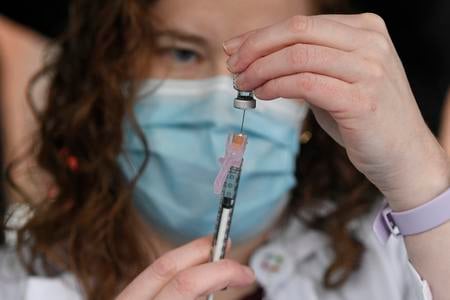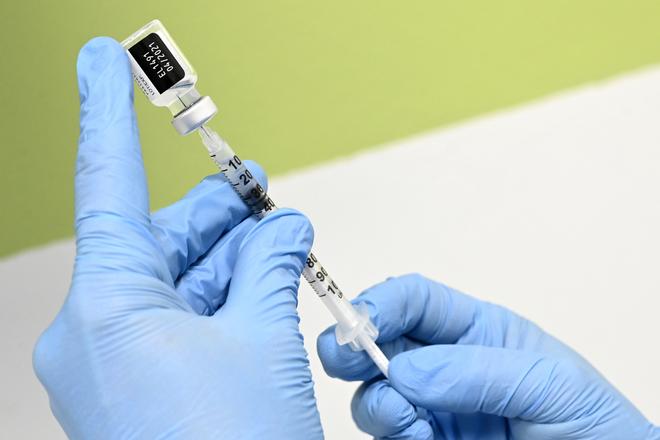Vaccination against COVID-19 started in Slovakia started in late December 2020. The first person received the jab on December 26.
Our paywall policy:
The Slovak Spectator has decided to make all the articles on the special measures, statistics and basic information about the coronavirus available to everyone. If you appreciate our work and would like to support good journalism, please buy our subscription. We believe this is an issue where accurate and fact-based information is important for people to cope.
When the Health Ministry originally presented in its vaccination strategy, it included four phases of the vaccination. Recently, it has published more details of its plan, extending the phases to 11 and specifying the age groups that will gradually receive the jab.
Those who wish to be vaccinated will have to book the date via the Korona.gov.sk website. No concrete dates have been published yet, though.
Currently, Slovakia uses two mRNA vaccines, produced by companies Pfizer/BioNTech and Moderna. People should receive two doses. Originally, people were expected to receive the second dose after 21 days. The ministry now extended it to 28 days.
More vaccines to come
Slovakia purchased more than four million new doses of vaccines from Pfizer/BioNTech and Moderna on January 18, PM Igor Matovič and Health Minister Marek Krajčí (both OĽaNO) told the press conference.
As a result, Slovakia has ordered enough vaccines for 85 percent of the adult population, according to Matovič.
Before January 18, the country had 2.4 million vaccines contracted from Pfizer/BioNTech. Their number should increase by almost 3.5 million thanks to the contract. At the same time, Slovakia previously ordered 960,000 vaccines from Moderna. The number will increase by another 600,000 vaccines due to the new deal.

As a result, Slovakia will have at its disposal almost 7.5 million vaccines from both producers for about 3.7 million of people.
The vaccines will not arrive straight away. While the first batch by Pfizer/BioNTech and Moderna, which has already been ordered, should be distributed in the first three quarters of 2021; the second batch from Pfizer/BioNTech is expected to arrive between the second and fourth quarter of the year, and the Moderna one only at the end of 2021.
Waiting for AstraZeneca
The AstraZeneca vaccine has not been approved by the EU. Krajčí said that it is expected to receive approval in the upcoming days. If so, the vaccine should be available in February.
Slovakia has ordered 3.6 million vaccines from this company.
Matovič also said that the adult population aged 18-45 may be vaccinated by the end of August, if vaccines deliveries are stable.
If the AstraZeneca vaccine is approved, people who should be vaccinated in the 11th phase of the vaccination strategy receive their first jabs in June.
11 vaccination phases (updated):
Phase 1:
healthcare staff;
students of medical or non-medical school who are in contact with Covic-19 patients;
nursing home staff;
in-field social workers;
employees of service organisations that secure services in hospitals;
employees of hospitals, emergency rescue services and ambulances who are in contact with COVID-19 patients;
registered Church members who offer clerical services to COVID-19 patients in hospitals or nursing homes;
staff at mobile testing sites who are in contact with tested people;
employees of employers who secure services for marginalised Roma communities and homeless people;
employees of employers who secure staff services for social service provides;
soldiers, police officers and firefighters helping with testing at the mobile testing sites and medical facilities.
If people booked for the given date fail to show up, the authority responsible for vaccination can take replacements, giving preference to people older than 65 years of age who are hospitalised in the facility.
Phase 2:
people older than 85 years of age
Phase 3:
people older than 75 years of age
Phase 4:
people older than 56 years of age who takes care of children until the age of 6, or employees of such facilities;
teachers younger than 55 years of age if the effects of the vaccine used on people older than 55 years cannot be assessed.
Phase 5:
peoworking in critical infrasl infrastructure who are:
*older than 56 years of age;
*younger than 55 years of age if the effects of the vaccine used on people older than 55 years cannot be assessed.
Phase 6:
people older than 56 years of age suffering from serious diseases, including:
*cancer patients;
*people who had transplantations;
*people who recovered from pneumonia;
*people who had sepsis;
*people with cardiovascular problems;
*people suffering from diabetes;
*HIV/AIDS patients;
*extremely obese people;
*patients suffering from kidney failure, serious immunity diseases or metabolic problems;
*people suffering from serious mental problems;
people older than 56 years of age receiving nursing benefits;
people older than 56 years of age taking care of severely disabled people.
Phase 7:
people younger than 55 years of age if the effects of the vaccine used on people older than 55 years cannot be assessed who:
*suffer from serious diseases (see the list above);
*receive nursing benefit;
*take care of severely disabled people.
Phase 8:
people older than 56 years of age suffering from moderate chronic diseases;
people younger than 55 years suffering from moderate chronic diseases if the effects of the vaccine used on people older than 55 years cannot be assessed.
Phase 9:
people older than 55 years of age
Phase 10:
people older than 45 years of age
Phase 11:
people older than 18 and younger than 45 years of age



 Illustrative stock photo (source: TASR)
Illustrative stock photo (source: TASR)